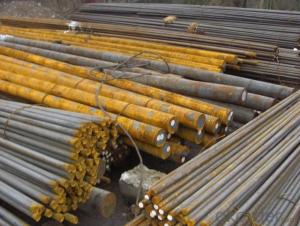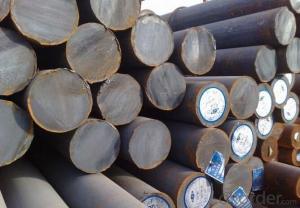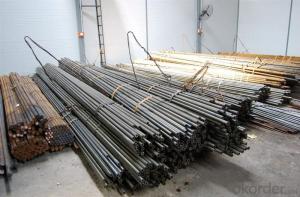Special Steel ASTM DIN JIS Standard 1020 Carbon Steel
- Loading Port:
- China main port
- Payment Terms:
- TT OR LC
- Min Order Qty:
- 30 m.t.
- Supply Capability:
- 10000 m.t./month
OKorder Service Pledge
OKorder Financial Service
You Might Also Like
Item specifice
Product information:
Specifications
Material | AISI 1020, S20C, C22,1.0402 | Round bar | Dia(mm) | Max 700 |
Process | EAF + LF + VD + Forged + Heat Treatment (optional) | Length (mm) | Max 12000 | |
Heat treatment | Normalized / Annealed / Quenched / tempered | Plate bar | Thickness(mm) | Max 200 |
Delivery condition | Hot forged +Rough machined (black surface after Q/T)+ Turned (optional) | Width(mm) | Max 3000 | |
Test | Ultrasonic test according to SEP 1921-84 D/d | Length (mm) | Max 12000 |
Chemical Composition
Standards: ASTM,JIS,GB,EN(DIN,BS,NF)
Grade | C | Si | Mn | Cr | Ni | Cu |
AIAI 1010 | 0.17~0.23 | 0.17~0.37 | 0.35~0.65 | ≤0.25 | ≤0.30 | ≤0.25 |
Application
Carbon steel rod applies to chemical industry, shipping industry,manufacturing industry, construction, decorate industry, electric power, pump shafts, sanitary wares, furniture handles, boiler, high temperature resistant,low temperature resistant,corrosion resistant
Product Show:
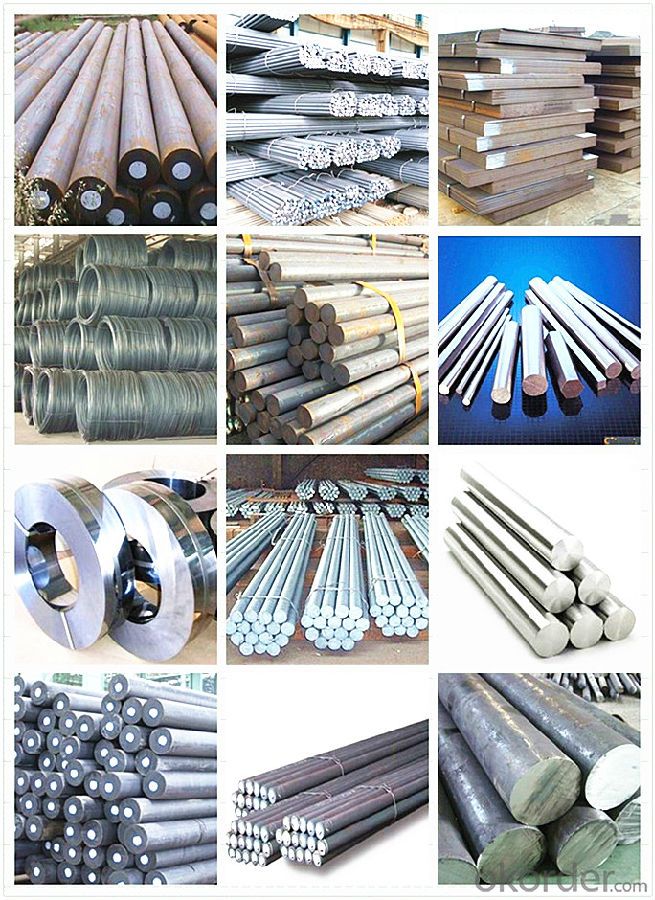
Workshop Show:
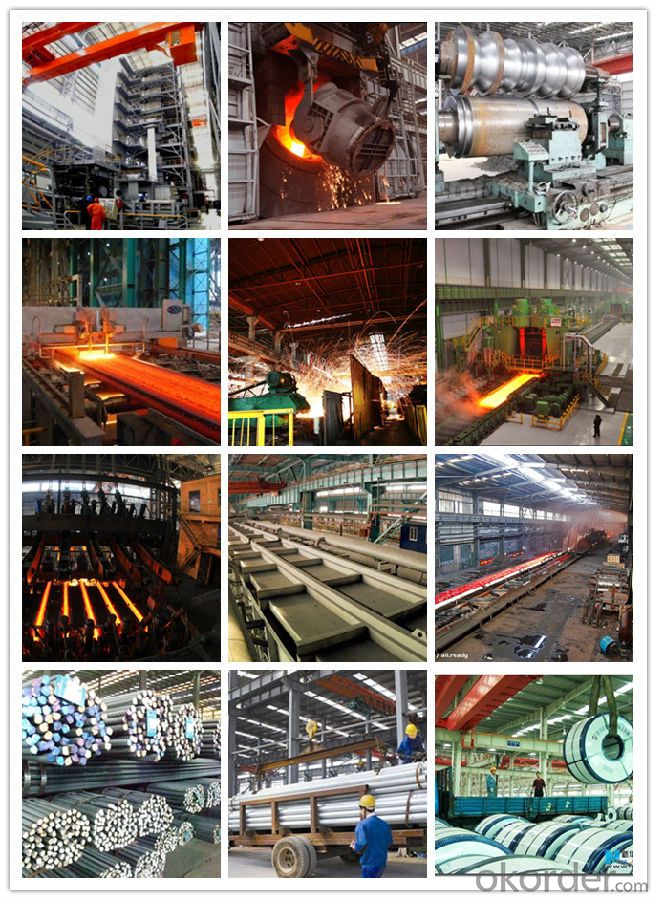
Shipping
1. FedEx/DHL/UPS/TNT for samples, Door-to-Door;
2. By Air or by Sea for batch goods, for FCL; Airport/ Port receiving;
3. Customers specifying freight forwarders or negotiable shipping methods!
Delivery Time: 3-7 days for samples; 5-25 days for batch goods.
Payment Terms
1.Payment: T/T, L/C, Western Union, MoneyGram,PayPal; 30% deposits; 70% balance before delivery.
2.MOQ: 1pcs
3.Warranty : 3 years
4.Package Informations: 1) EXPORT, In 20 feet (GW 25 ton) or 40 feet Container (GW 25 ton)
2)as customer's requirement
Why choose us?
(1) The leading exporter in China special steel industry.
(2) Large stocks for various sizes, fast delivery date.
(3) Good business relationship with China famous factories.
(4) More than 7 years steel exporting experience.
(5) Good after-sales service guarantee.
- Q:What are the challenges in machining special steel with complex geometries?
- Machining special steel with complex geometries poses several challenges. Firstly, the high hardness of special steel makes it difficult to cut and shape. This requires the use of specialized cutting tools and techniques to ensure precision and avoid tool wear. Secondly, the complex geometries of the steel components make it challenging to achieve accurate and consistent machining. This may require the use of advanced CNC machines and software programming to accurately replicate the intricate shapes. Additionally, the heat generated during machining can lead to thermal distortion and surface hardening, which further complicates the process. Therefore, careful planning, efficient cooling, and proper machining parameters are essential to overcome these challenges and achieve the desired results.
- Q:How is tool and die steel used in the manufacturing of molds and dies?
- Tool and die steel is used in the manufacturing of molds and dies because of its high hardness, wear resistance, and toughness properties. It is used to create and shape various components of molds and dies, such as inserts, cavities, and cores, which are crucial in the production of plastic, metal, or other materials. Additionally, tool and die steel also provides the necessary strength and durability to withstand the high pressure, heat, and repeated use involved in the manufacturing process.
- Q:How does special steel contribute to the medical field?
- Special steel plays a crucial role in the medical field by offering unique properties and characteristics that are essential for various medical applications. Firstly, special steel is widely used in the production of surgical instruments and medical devices due to its exceptional strength, durability, and corrosion resistance. These qualities ensure that the instruments can withstand the demanding environment of surgical procedures, remain sharp for extended periods, and resist the effects of sterilization processes. Additionally, special steel is utilized in the manufacturing of implants and prosthetics. Its biocompatibility and high strength-to-weight ratio make it an ideal material for creating artificial joints, spinal implants, and dental implants. Special steel's ability to integrate with the human body without causing adverse reactions or rejection is crucial for the success of these medical interventions. Moreover, special steel is employed in the production of medical equipment such as MRI machines, X-ray machines, and radiation shields. The unique magnetic properties of certain types of special steel enable the creation of powerful magnets used in MRI machines, allowing for detailed and accurate imaging of the human body. Furthermore, special steel's ability to shield against radiation makes it an essential component in radiation therapy equipment, protecting healthcare professionals and patients from harmful radiation exposure. In summary, special steel is a critical material in the medical field due to its strength, durability, corrosion resistance, biocompatibility, and unique magnetic properties. Its applications range from surgical instruments and medical devices to implants, prosthetics, and medical equipment. The contributions of special steel in the medical field are indispensable, ensuring the safety, effectiveness, and success of various medical procedures and treatments.
- Q:Can special steel be used for making renewable energy equipment?
- Yes, special steel can be used for making renewable energy equipment. Special steel, also known as high-performance or alloy steel, offers a range of properties that make it suitable for use in various renewable energy applications. For example, in wind energy, special steel can be used to manufacture wind turbine components such as rotor blades, tower structures, and drive train systems. The high strength and corrosion resistance of special steel ensure the durability and longevity of these components, which are exposed to harsh weather conditions and continuous mechanical stress. In solar energy, special steel can be utilized in the construction of solar panels, support structures, and tracking systems. The material's excellent thermal conductivity and resistance to deformation make it ideal for efficiently capturing and converting solar energy into electricity. Additionally, special steel can be employed in the production of hydroelectric power equipment, such as turbine blades, runners, and penstocks. Its high tensile strength and resistance to erosion and cavitation enable these components to withstand the forces and pressures associated with water power generation. Furthermore, when it comes to biomass energy, special steel can be used in the fabrication of bioenergy plants and equipment. Its heat resistance and corrosion properties make it suitable for handling high temperatures and corrosive substances involved in the biomass conversion process. Overall, special steel's unique combination of strength, durability, corrosion resistance, and thermal properties make it an excellent choice for manufacturing renewable energy equipment, contributing to the development and sustainability of the renewable energy industry.
- Q:What are the requirements for special steel used in renewable energy equipment manufacturing?
- The requirements for special steel used in renewable energy equipment manufacturing are quite specific and unique compared to traditional steel used in other industries. Given the demanding nature of renewable energy equipment, the steel used must possess certain characteristics and properties to ensure optimal performance and durability. 1. Corrosion Resistance: Special steel used in renewable energy equipment must have excellent corrosion resistance to withstand exposure to harsh environmental conditions. This is particularly important for offshore wind turbines or solar panels installed in coastal areas with high salt content in the air. 2. High Strength and Toughness: The steel should have high strength and toughness to withstand mechanical stresses and loads. Renewable energy equipment, such as wind turbine towers or hydroelectric dams, experiences significant forces, including strong winds, water pressure, or vibrations. Steel with high strength can provide the necessary structural integrity to handle these forces. 3. Fatigue Resistance: Given the cyclic nature of renewable energy equipment, the steel must have excellent fatigue resistance. Wind turbines, for example, constantly experience alternating loads due to wind gusts and rotational forces. Special steel with fatigue resistance properties can prevent structural failures caused by repeated stress. 4. Weldability: Weldability is a crucial requirement for the steel used in renewable energy equipment manufacturing. Many components of renewable energy systems require welding, and the steel must be easily weldable without compromising its strength or other properties. 5. Environmental Sustainability: As renewable energy equipment is designed to promote sustainability, the steel used should align with this objective. Steel manufacturers are increasingly focusing on reducing the carbon footprint of their products by using recycled content or adopting greener production processes. 6. Cost-effectiveness: While meeting all the above requirements, special steel used in renewable energy equipment must also be cost-effective. The steel should provide the desired properties at a reasonable cost to ensure the competitiveness and viability of renewable energy projects. To meet these requirements, steel manufacturers often develop specific grades or alloys that cater to the needs of renewable energy equipment manufacturers. These grades are continuously evolving as the renewable energy industry advances, enabling the production of more efficient and durable equipment to support the transition to clean energy sources.
- Q:How does special steel contribute to the automotive safety?
- Special steel, such as high-strength steel, plays a crucial role in enhancing automotive safety. It is used in various components of vehicles, including the chassis, body structure, and safety systems, to provide superior strength and durability. This type of steel helps improve crashworthiness by absorbing and distributing impact energy, reducing the risk of passenger injury. Additionally, special steel helps optimize the weight-to-strength ratio of vehicles, allowing manufacturers to design lighter yet safer cars that offer improved fuel efficiency and handling.
- Q:What are the different heat treatment processes used in special steel production?
- Some of the different heat treatment processes used in special steel production include annealing, tempering, quenching, normalizing, and hardening.
- Q:What are the characteristics of special stainless steel?
- Special stainless steel distinguishes itself from regular stainless steel through its exceptional properties. Some of the notable traits of this type of stainless steel are as follows: 1. Unparalleled Resistance to Corrosion: Unlike regular stainless steel, special stainless steel boasts a higher degree of corrosion resistance. It can endure exposure to harsh surroundings, such as saltwater or acidic substances, without undergoing corrosion or deterioration. 2. Impressive Endurance of High Temperatures: Special stainless steel is engineered to withstand elevated temperatures without compromising its structural integrity. This makes it suitable for industries like aerospace, automotive, and power generation, where extreme heat endurance is essential. 3. Reinforced Strength and Durability: Special stainless steel is commonly alloyed with other elements to enhance its strength and durability. Consequently, it exhibits remarkable resistance to deformation, cracking, and wear, ensuring its longevity and reliability in demanding conditions. 4. Exceptional Mechanical Properties: Special stainless steel possesses outstanding mechanical properties, including high tensile strength, toughness, and ductility. These properties make it an ideal choice for applications that require a high load-bearing capacity, such as structural components and machinery. 5. Distinctive Magnetic Properties: Depending on its composition, special stainless steel can display a range of magnetic properties, varying from non-magnetic to highly magnetic. This versatility enables its use in applications that demand magnetic properties, such as magnetic resonance imaging (MRI) machines or electrical transformers. 6. Hygienic and Easy to Maintain: Special stainless steel is renowned for its hygienic properties, rendering it suitable for applications in the food and healthcare industries. It is non-porous, resistant to bacterial growth, and easy to clean, making it an ideal choice for equipment and surfaces that must meet stringent sanitary standards. 7. Aesthetic Allure: The aesthetic appeal of special stainless steel often leads to its utilization in architectural and design applications. It can be polished to achieve a mirror-like finish, lending it a sleek and contemporary appearance. Moreover, its malleability and weldability allow for limitless creative design possibilities. In conclusion, special stainless steel possesses an array of exceptional properties, encompassing high corrosion resistance, temperature resistance, strength, durability, excellent mechanical properties, unique magnetic properties, hygienic features, and aesthetic appeal. These characteristics position it as the preferred choice for a wide range of industrial, commercial, and domestic applications.
- Q:What are the different wear-resistant grades of special steel?
- There are several different wear-resistant grades of special steel available, each with their unique properties and applications. Some of the commonly used grades include: 1. D2 Steel: This grade of steel is known for its high wear resistance and excellent toughness. It is often used in the manufacturing of cutting tools, punches, and dies. 2. M2 Steel: M2 steel is a high-speed steel with exceptional wear resistance and heat resistance. It is commonly used in the production of drill bits, milling cutters, and other tools that require high hardness and wear resistance. 3. A2 Steel: A2 steel is a versatile grade known for its excellent wear resistance and toughness. It is frequently used in the manufacturing of cold work tools, such as blanking dies and gauges. 4. O1 Steel: O1 steel is an oil-hardening tool steel with good wear resistance and dimensional stability. It is commonly used in the production of blades, punches, and other cutting tools. 5. S7 Steel: S7 steel is a shock-resistant grade with high wear resistance. It is often used in the manufacturing of chisels, shear blades, and other tools that require resistance to impact and wear. 6. AR400 Steel: AR400 steel is a specific type of abrasion-resistant steel with a hardness of around 400 Brinell. It is frequently used in heavy-duty applications such as mining equipment, bulldozer blades, and dump truck bodies. These are just a few examples of the different wear-resistant grades of special steel available in the market. The choice of grade depends on the specific requirements of the application, such as the type and intensity of wear, operating conditions, and desired hardness. Consulting with a steel supplier or expert can help in selecting the most suitable grade for a particular application.
- Q:How does special steel respond to welding?
- Special steel, also known as alloy steel, exhibits unique properties that affect its response to welding. Unlike regular carbon steel, special steel contains additional alloying elements such as chromium, nickel, or molybdenum, which enhance its strength, corrosion resistance, and heat resistance. When it comes to welding, special steel generally responds well due to its high tensile strength and toughness. However, there are a few considerations to keep in mind. The high carbon content in some special steels can lead to cracking or brittleness during the welding process. To prevent this, preheating the material and using appropriate welding techniques are crucial. It is important to choose the right welding method based on the specific type of special steel being used. For instance, gas tungsten arc welding (GTAW) or tungsten inert gas (TIG) welding is commonly preferred for welding stainless steel, as it ensures excellent control over the heat input and produces high-quality welds with minimal distortion. Furthermore, special steel often requires the use of special welding consumables, such as electrodes or filler wires, specifically designed for the particular alloy composition. These consumables help maintain the desired mechanical properties and prevent the formation of brittle phases in the weld. Post-weld heat treatment is also essential for certain special steels, as it helps relieve residual stresses and improves the overall weldment's properties. This process can involve annealing, normalizing, or tempering, depending on the specific steel grade and application requirements. In conclusion, special steel responds well to welding, but it's essential to consider its alloy composition, carbon content, and specific welding techniques. By following proper welding procedures, using appropriate consumables, and applying necessary heat treatments, high-quality welds can be achieved, ensuring the integrity and performance of the special steel components.
1. Manufacturer Overview |
|
|---|---|
| Location | |
| Year Established | |
| Annual Output Value | |
| Main Markets | |
| Company Certifications | |
2. Manufacturer Certificates |
|
|---|---|
| a) Certification Name | |
| Range | |
| Reference | |
| Validity Period | |
3. Manufacturer Capability |
|
|---|---|
| a)Trade Capacity | |
| Nearest Port | |
| Export Percentage | |
| No.of Employees in Trade Department | |
| Language Spoken: | |
| b)Factory Information | |
| Factory Size: | |
| No. of Production Lines | |
| Contract Manufacturing | |
| Product Price Range | |
Send your message to us
Special Steel ASTM DIN JIS Standard 1020 Carbon Steel
- Loading Port:
- China main port
- Payment Terms:
- TT OR LC
- Min Order Qty:
- 30 m.t.
- Supply Capability:
- 10000 m.t./month
OKorder Service Pledge
OKorder Financial Service
Similar products
New products
Hot products
Related keywords
